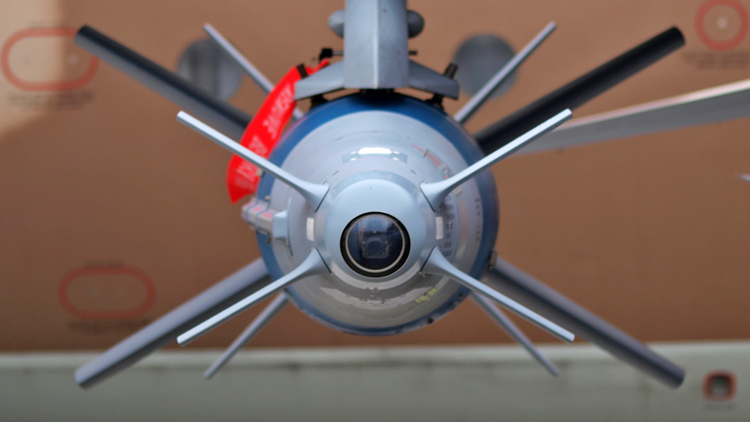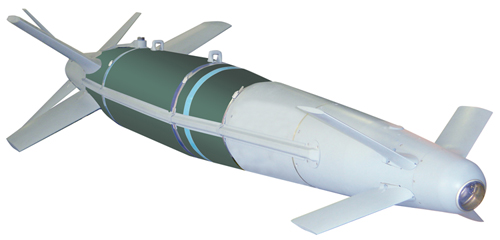INDIAN ARMED FORCES CHIEFS ON
OUR RELENTLESS AND FOCUSED PUBLISHING EFFORTS

SP Guide Publications puts forth a well compiled articulation of issues, pursuits and accomplishments of the Indian Army, over the years

I am confident that SP Guide Publications would continue to inform, inspire and influence.

My compliments to SP Guide Publications for informative and credible reportage on contemporary aerospace issues over the past six decades.
India signs $43.2 Million contract for Spice smart bombs
Emergency purchase is the first defence deal by the new Government, to build up war reserve stockpile

The Indian Air Force (IAF) on June 6 signed a 300 Crore ($43.18 Million) contract with Rafael Advanced Defense Systems of Israel for 100 Spice glide bombs which were used in India's landmark Balakot air strike against the Jaish-e-Mohammed terrorist camp in Pakistan on February 26.
This is the first military contract to be signed by the Narendra Modi Government in its recently commenced second term in office.
"This is an emergency procurement under financial powers delegated to the Vice-Chief of Air Staff Air Marshal RKS Bhadauria. This is a critical operational necessity to build up the stocks for this precision bomb," a highly-placed source confirmed to this reporter.
While the existing stockpile and the fresh order is for the IAF's Mirage-2000 squadrons, it is also planning to equip the frontline Sukhoi-30MKI squadrons with Spice precision bombs. The process for integrating Rafael's Litening targeting pods on the IAF Sukhois has already commenced
SP's had recently reported that Spice 2000 bombs are now being made in India at the Kalyani Rafael Advanced Systems (KRAS) joint venture in Hyderabad. But the which was ordered on June 6 is to be imported off the shelf from Israel under the fast track process. Sources suggested that the delivery is to be completed in three months.
While the existing stockpile and the fresh order is for the IAF's Mirage-2000 squadrons, it is also planning to equip the frontline Sukhoi-30MKI squadrons with Spice precision bombs. The process for integrating Rafael's Litening targeting pods on the IAF Sukhois has already commenced.
In an interview to SP's, Yuval Miller, executive vice-president of Rafael, disclosed that the second lot of Spice munitions recently supplied to the IAF was produced by KRAS in Hyderabad.

Getting in line with the Make in India policy, Rafael is considering producing its entire range of weaponry in India at its KRAS JV. It is offering in response to an Indian RFI, the long-range glide bomb "with almost 100 per cent Indian content", and Rocks, the extended range version of Spice, capable of being fired at moving or fixed, highly fortified targets "hundreds of kilometres" away, Miller disclosed. "There are strong requirements in the arena that is evolving here," Miller said. "There's always better (enemy) air defence. IAF is trying to find the right solutions for those challenges," he added.
The Litening pod is also being made substantially in India with another Rafael partner, Defsys. Almost the entire IAF fighter fleet is expected to be fitted with Litening pods.
Getting in line with the Make in India policy, Rafael is considering producing its entire range of weaponry in India at its KRAS JV. It is offering in response to an Indian RFI, the long-range glide bomb "with almost 100 per cent Indian content", and Rocks, the extended range version of Spice, capable of being fired at moving or fixed, highly fortified targets "hundreds of kilometres" away, Miller disclosed
The Spice bomb has a stand-off range of 60 kilometres and approaches the target with its scene-matching algorithm comparing the electro-optical image received in real-time via the weapon seeker with mission reference data stored in the weapon computer memory, adjusting the flight path along the way. Warheads include the MK-84, BLU-109, APW and RAP-2000.
The utility of the Spice munitions was demonstrated to telling effect in the February 26 cross-border air strike by the IAF in response to the killing of 40 Central Reserve Police Force personnel in a terrorist attack on the convoy in which they were travelling at Pulwama in Jammu and Kashmir. The Pakistan-based, UN-proscribed terrorist group Jaish-e-Mohammad had claimed responsibility for the killings of the Indian troopers.





